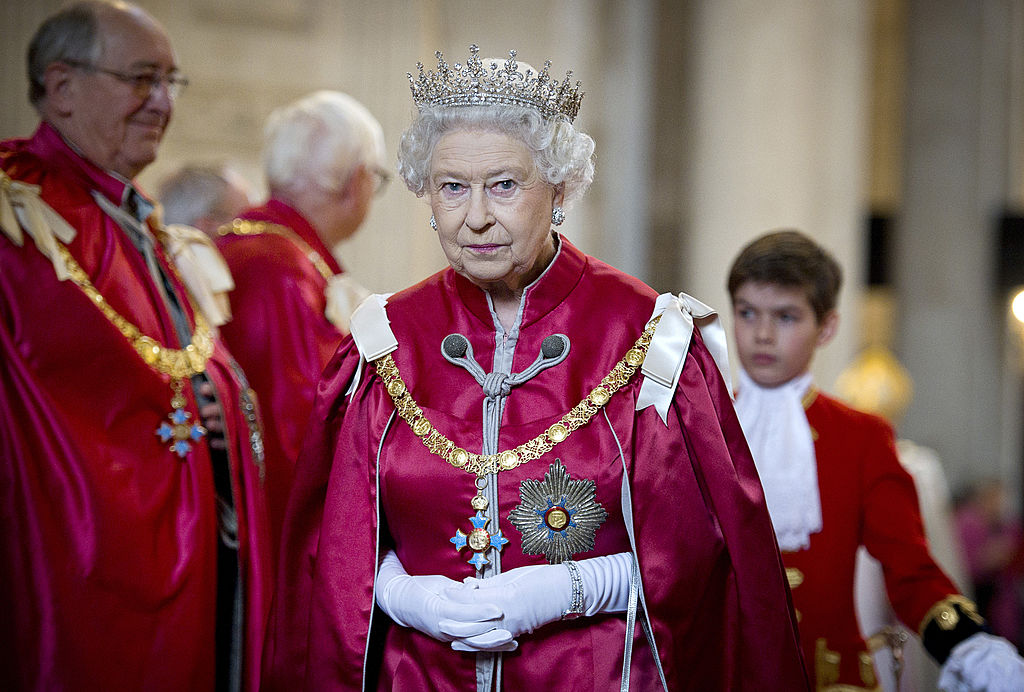As Alexander Larman writes, the passage of the Queen is not a tragedy.
No life lived so well, so dutifully, and with such faith in so many things now lost to us can be considered a tragedy. But it is nonetheless very sad, even for those of us in America — a nation she loved in so many ways.
Her death seems like another blow to another important institution of the West, undermined in recent decades by boomer proclivities and millennial narcissism, and likely to break into a thousand pieces in the absence of the old-world values Elizabeth represented.
What is more tragic, and more offensive, is the degree to which the Queen’s passing has been met by historical ignorance from the anti-Western left and its attendant useful idiots on the decadence-obsessed right.
Thus did Carnegie Mellon University professor Uju Anya write, “I heard the chief monarch of a thieving raping genocidal empire is finally dying. May her pain be excruciating. That wretched women and her bloodthirsty throne have fucked generations of my ancestors on both sides of my family, and she supervised a government that sponsored the genocide my parents and siblings survived. May she die in agony.”
“The British Empire was a colonizing empire. Which made her a colonizer Queen,” said MSNBC pundit and author of This is Why I Resist Shola Mos-Shogbamimu. “Part of her legacy is that colonization. It is the atrocities that were committed in the name of Queen or country during the colonizing period.” She later posted, “The Queen can’t be reason for Britain’s greatness but NOT be reason for atrocities as Colonizer Queen & doing nothing about systemic racism today.”
“As the first generation of my family not born in a British colony, I would dance on the graves of every member of the royal family if given the opportunity, especially hers,” wrote Rhode Island School of Design professor Zoé Samudzi.
Huffington Post opinion editor Stephen Crockett Jr. posted, “The way I wish newspapers would write: ‘Colonizers lost one of their most beloved foot soldiers as Queen Elizabeth II, 96, mostly known for fuckshit and racism.’”
Atlantic writer and failed ESPN host Jemele Hill wrote, “Journalists are tasked with putting legacies into full context, so it is entirely appropriate to examine the queen and her role in the devastating impact of continued colonialism.”
And Harvard professor Maya Jasanoff wrote of the Queen in the New York Times, “We should not romanticize her era” because she put a “stolid traditionalist front over decades of violent upheaval” and her image served to “obscure a bloody history of decolonization.” And perhaps most damning of all: “She was, of course, a white face on all the coins, notes and stamps circulated in a rapidly diversifying nation.”
Of course, a more historically accurate depiction of the Queen’s tenure was that she oversaw a decolonization process that played out around the world, and did so with a great sense of responsibility and duty. In fact, it is no exaggeration to say that Queen Elizabeth’s presence was a key part of making decolonization possible, creating a great sense of fellow feeling for an international community of Britons distressed at what the new reality could bring.
If there were one mission, one duty that stood foremost in the Queen’s mind during her long reign, it was the positive transition from Empire to Commonwealth — with a consistent emphasis on preserving the best of a common culture while discarding obsolete notions of the past. The rage-filled partisans of the radical anti-Western left will bristle, but those nations emerging from the British colonial experience have generally found themselves more stable, more committed to human rights, and more dedicated to the rule of law than others.
This is in no small part due to the Queen’s insistence on “keeping the family together” under a new vision of the cooperation of equals. No other former colonial power even attempted such a commitment to its former colonies and their peoples.
There was no small amount of snickering comments during these years about the Queen’s colorful costumes and decidedly un-British ceremonies. She was, however, never deterred by the criticism. Her mission was abidingly clear: a respect for the good found in other cultures and traditions, along with the respect for the true and good found in the past. Both must be honored if the Commonwealth is to have meaning.
As Mary Harrington writes at Unherd:
In her single person, and in her dedication to a selfless life of public service, our late Queen embodied continuity across nearly a century of seismic change. She sailed serenely through the dismantling of the British Empire, accepting without demur its transmutation to a “Commonwealth” and her role as figurehead of that entity.
In this way, more than any other single individual, she both guided and personified Britain’s transition from the most sprawling empire in history to…whatever it is we are now. In her calm and stalwart presence, Great Britain managed to act as though nothing had really changed, or if it had it was all for the best. We could ignore the fading carpets, and the Russian oligarchs buying up grand country estates. We could ignore the ugly buildings where beautiful ones used to stand. We could ignore our apparent inability to build new infrastructure, or to agree over whether or how to defend our borders, or what our history means…
It was Victoria and Albert who first embraced monarchy as a form of moral leadership, pioneering the sober stoicism we’ve come to associate with our Queen. But it has been Elizabeth who most fully embraced that duty, and led by example – as at Prince Philip’s funeral. In her reign, this symbolic monarchy has taken on ever more intense meaning: for if Victoria still wielded a measure of direct power, as Empress of an immense territory, so the Queen’s moral leadership seemed to become more important, and weighty, as that territory evaporated.
What the ignorant leftists fail to understand is that a figure of such stability was essential to a historically unstable process.
The violence of the Mau Mau rebellion in Kenya had peaked a little more than a year before Elizabeth gave the first televised Christmas address to the British people, in which she said:
That it is possible for some of you to see me today is just another example of the speed at which things are changing all around us. Because of these changes I am not surprised that many people feel lost and unable to decide what to hold on to and what to discard — how to take advantage of the new life, without losing the best of the old.
But it is not the new inventions which are the difficulty. The trouble is caused by unthinking people who carelessly throw away ageless ideals as if they were old and outworn machinery. They would have religion thrown aside, morality in personal and public life made meaningless, honesty counted as foolishness and self-interest set up in place of self-restraint.
At this critical moment in our history we will certainly lose the trust and respect of the world if we just abandon those fundamental principles which guided the men and women who built the greatness of this country and Commonwealth.
The nature of that Commonwealth also matters. A majority of its nations are republics, and member status offers a position so attractive that four nations — Rwanda, Mozambique, Gabon and Togo — chose to join it without ever being part of the British Empire. One of Nelson Mandela’s first actions in post-apartheid South Africa was to rejoin the Commonwealth.
The Queen’s legacy is not one of conquest or colonization. It is one of an Empire transitioning into a Commonwealth. It is not one of blood, but of offering the comfort of stability and encouragement of respect within the great unwinding period of the 20th century. She gave the people the assurance that not all would be cast aside.
This role should not be dismissed or considered as light responsibility. On the contrary, it was essential to the whole. Those who cry out about blood on her hands betray how unserious they are about the vital nature of such leadership in a world of storm.

























